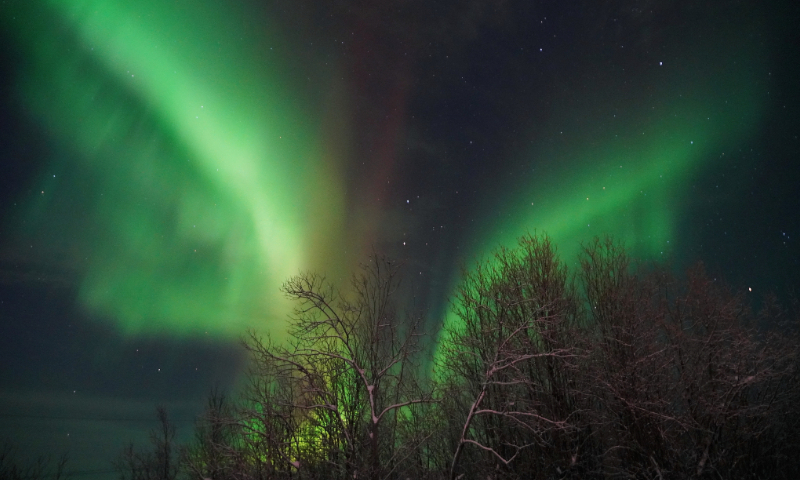Aurora-seeking Chinese flock to Russian cities, with the number expected to surpass 1 million
Most visitors are business tourists as China-Russia economic and trade cooperation deepens

A spectacular Northern Lights display lights up the sky over Murmansk, Russia, creating a magnificent scene on December 6, 2023. Photo: VCG
Despite a less-than-expected booster effect from a loosened visa policy, Chinese tourists are arriving at Russia's snow-clad cities en masse and the number is likely to surpass 1 million this year, people familiar with the situation told the Global Times on Thursday.
At Russian Arctic port city Murmansk, Chinese tourists are arriving on shuttle buses to the city center from all directions.
Li Zhun, a Chinese tour operator, said there must be 1,000 to 2,000 Chinese tourists each day in the city.
"Each day, there are at least 40 tour groups from China in the city. Nearly 80 percent of the guests came from southern Chinese provinces such as Guangdong and Fujian, and display a strong enthusiasm for the snow country. The aurora just keeps them captivated," Li said.
"Now I am so busy that I don't have time to eat. And I think the city's tourism reception function is on the verge of being overwhelmed. It is totally unexpected!" Li said.
Russia lowered the entry requirement for tour groups from China this year and in August, it began offering e-Visas that further facilitated Chinese visits.
The e-Visa allows citizens from 55 countries to make short-term stays for 16 days. Russian news agency Sputnik reported on December 14 that some 70,000 Chinese citizens applied for e-Visas in the first four months of the new policy.
Chen Zhigang, director general of the Russian-Chinese Business Park in St. Petersburg, confirmed the rush as he received a large number of visiting Chinese delegations this year.
Chen said he believes Chinese tourist visits to Russia will likely exceed 1 million in 2023 and 80 percent of these have come with business tour groups.
"We at the Russian-Chinese Business Park alone have received over 40 delegations composed of entrepreneurs, government officials as well as those from the academic and cultural circles from China. Delegations came from across China, and the three northeastern provinces, in particular, sent a large number of groups of various sorts to explore commercial opportunities," Chen said.
However, Chen said the booster effect of the visa policy fell short of expectations as it was introduced after the peak summer season.
Policy support, visa procedure, aviation and logistics have all returned to pre-COVID levels or become even more convenient in Russia, and tourism infrastructure has also improved and been expanding, industry experts said.
Chen said both the Chinese and Russian tourist industry representatives firmly believe that 2024 will be "an unusually strong year for the Russian tourism market when a large number of Chinese visitors will arrive, and a crucial year that will bolster the strength of the Russian tourism industry before it returns to its pre-COVID level."
Chen noted that the current rush of business tours to Russia will bode well for bilateral trade and economic cooperation in 2024.
Trade between China and Russia has surged by 26.7 percent year-on-year in the first 11 months of this year to reach $218 billion.
The figure is a milestone for bilateral economic ties, as the two countries achieved their yearly $200 billion trade goal ahead of schedule. In 2019, China and Russia set a goal of ramping up bilateral trade to reach $200 billion by 2024.
"For China-Russia trade, 2023 was not a year without glitches. There have been issues in financial connectivity and currency settlement, and Chinese people could not easily visit Russia during much of the first six months of the year, yet we can see that the bilateral trade has surpassed $218 billion," Chen said, noting that in 2024 the prospect of bilateral trade is very optimistic.
Normal economic and trade cooperation between China and Russia on the basis of mutual respect, equality and mutual benefit should not be subject to interference or restrictions by any third party, a spokesperson for China's Foreign Ministry told a press conference on Tuesday.


